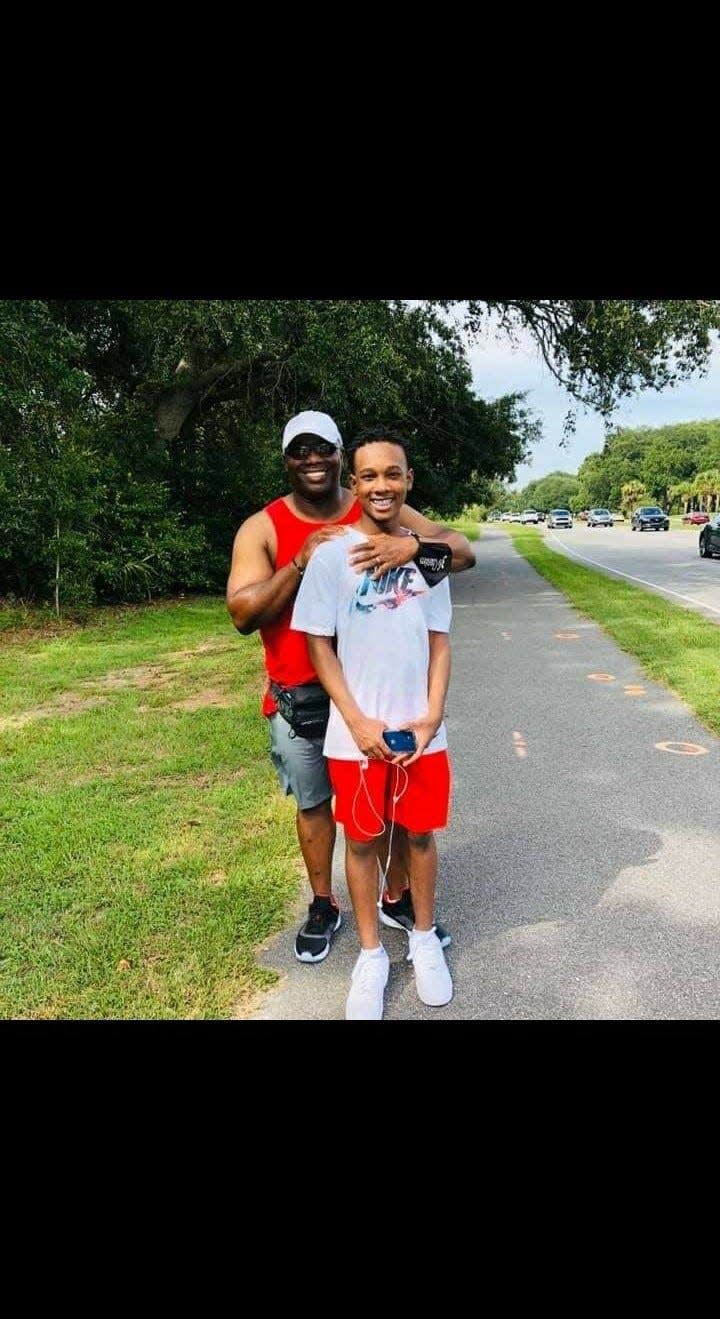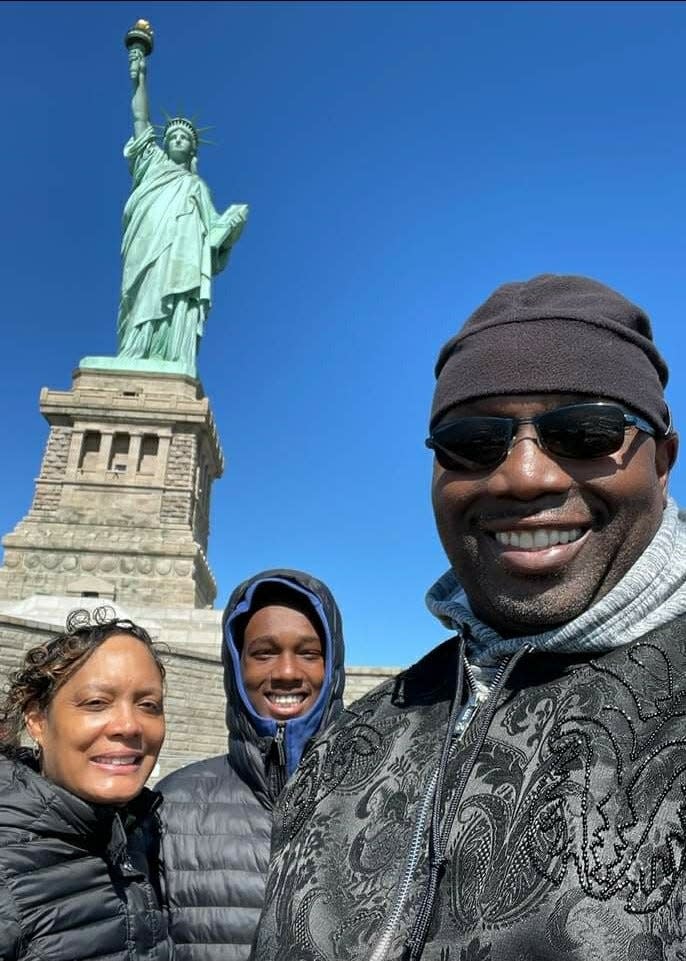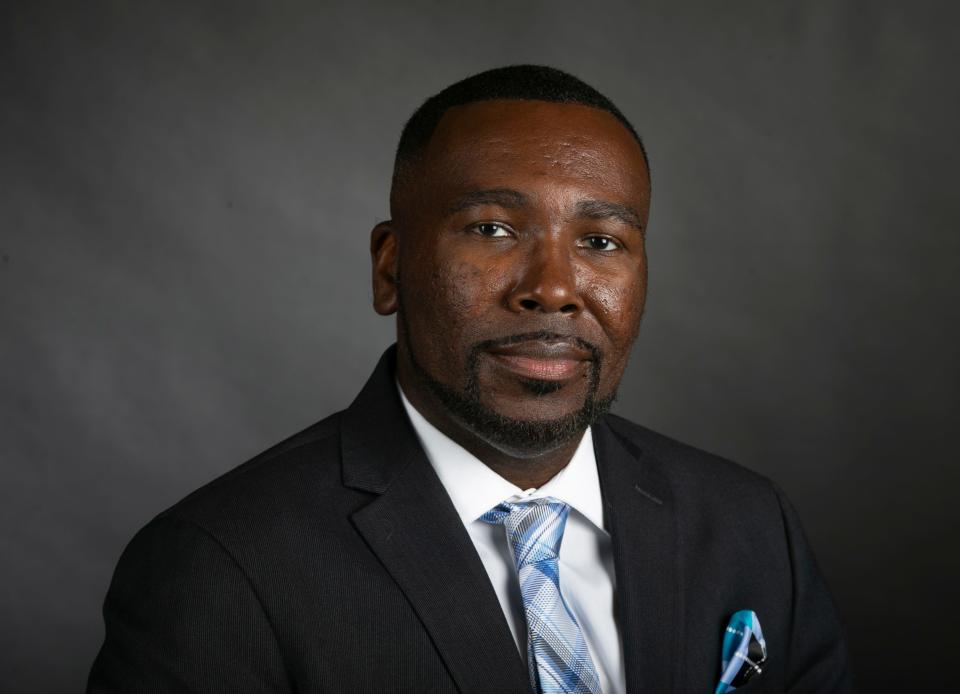Opinion: Think Black fathers are absent? Then you need to meet these guys
Donald Jordan wants to change the negative perception America has about Black fathers who are too often cast as deadbeats and absent from their kids' lives.
"I don't like to say I want to change the narrative. I want to create the narrative about Black fathers and being present in their children's lives," said Jordan, father of a 13-year-old son named Avery. " It's not like we haven't been there, but it's just not put out into the atmosphere (by media)."
That's why Jordan set out to tell the story about Black fathers not often heard. He partnered with the group Black Women Cultivating Change to produce a documentary on Black fatherhood titled "Presence Over Presents." The 27-minute-long film featuring the stories of Jordan and four other Cincinnati-area fathers and their children debuted Saturday – just in time for Father's Day – before a large crowd at the Greater Cincinnati Foundation office.
"It's always been a dream of mine to highlight fatherhood ever since I became a father," said Jordan, 52. "Besides producing my son, this is the greatest project I've ever been a part of."

The documentary, which cost $7,500 to make, was supported by monetary and in-kind contributions from the Greater Cincinnati Foundation, 1N5, Interact for Health, Center for Closing the Health Gap, Black Art Speaks, Easley Blessed Photography and a couple of private individual donors.
"I was proud of the way the community and these organizations stepped up with their dollars to support this documentary displaying Black fatherhood," said Ashley Glass, founder and CEO of Black Women Cultivating Change. "We knew we had a good idea, but we didn't know how others would respond."
The goal of the documentary is to promote and highlight what Jordan called "one of the best kept secrets" in America, Black fathers being present, engaging with their children in everyday activities like cooking and having dinner together, riding bikes, playing sports, doing homework and having conversations about life. Jordan and Glass said they also hope this film will encourage and inspire fathers who haven't been as involved in their children's lives to make a change.
"There are maybe some men out there who haven't been involved with their kids and they think it's too late. It's not too late. Go get your babies," Jordan said.
Jordan knows firsthand the trauma a child suffers when their dad is not around. His father spent the first 18 years of his life in prison for murder. Jordan said his father's absence motivates him to be a better dad to his own son.
"I said I'm not going to be like my father. I'm not going to jail," said Jordan, who is a 22-year veteran law enforcement officer. "Everything I wanted my father to do with me, I do with my son, from eating breakfast together to eating dinner together. Ultimately, my goal is for him to be a great father."
Jordan said the documentary has been a therapy of sorts for him to deal with his own daddy issues. It's a sentiment shared by Glass, a 34-year-old single mother of three kids, ages 12, 8 and 7.
"My kids' father is not very active in their lives," she said. "Watching this documentary, I was glad I had kind of healed my own past traumas because I had kind of a negative picture of Black men, too, dealing with my kids' father. I felt that Black men weren't taking care of their responsibilities. But doing this documentary really even helped me become a better parent as well as show grace and understand there are good Black men out there and good Black fathers who are taking care of their families and doing great things. This was the positive imagery that even I needed."
Glass said she hopes that women, in addition to men, take the time to watch, learn and heal from the documentary.
"Black fathers don't get enough credit," said Patrick Cartier, a 35-year-old father of three featured in the documentary. "I feel like we get talked bad upon, you know all the baby daddy stories or whatever. But I feel like there's a lot more of us out here taking care of our kids, being in their lives, doing what we need to do. I feel like that needs to be recognized."
Cartier, the community engagement and communications manager for the Avondale Development Corporation, is a single father. His kids' mother died in 2020 from pneumonia, influenza and organ failure associated with COVID-19. He talks in the film about the struggles of helping his children navigate milestones such as graduations, birthdays and Mother's Day by himself.
"It's tough to have to be mom and dad for the emotional stress that kids go through," Cartier said. "I just want them (my kids) to know and remember how dedicated I was to our family."
And that's what this project is all about. Black fathers who are always present for their family and not just showing up at Christmas or on birthdays with gifts meant to compensate for their absence.
"The title of this documentary means we are going to be present from birth to the rest of this child's life," Jordan said. "If my son is on the basketball court or football field, he's going to look over in the stands and see my presence. I know what it is to be disappointed when you look in the stands and nobody's there."
Jordan said he passes up $20,000 to $30,000 a year in overtime on his job, just so he spend more time at home with his family.
"I don't want my wife to raise our son by herself," he said. "It literally takes both of us to help him with his schedule. I don't want my son to ever feel like I'm not there for him."

"Presence Over Presents" is a short but powerful documentary that I hope all of Greater Cincinnati will take time out to view. It's a chance to see Black men – Black fathers in particular – portrayed in ways other than on sports fields or in handcuffs. As the product of a present and responsible Black father, the film resonated with me and my experience. Though all different, Jordan, Cartier, Charles Williams, Mitch Harris and Greg Phelia, Jr., each reminded me of my own father in some way.
Jordan called the documentary "a love story," and he's right. It is. Beautifully told and visually captivating, "Presence Over Presents" is a must-watch for anyone truly interested in dispelling the myths and stereotypes of the absent Black father. And I'm certain it will change hearts and inspire those dads – no matter their skin color – who are currently shirking their responsibilities to refocus and reconnect with their children.
Because as Jordan so aptly put it, "Every child wants the love of their father."
Opinion and Engagement Editor Kevin S. Aldridge can be reached at kaldridge@enquirer.com. Twitter: @kevaldrid.

This article originally appeared on Cincinnati Enquirer: Opinion: Think Black fathers are absent? Then you need to meet these guys

